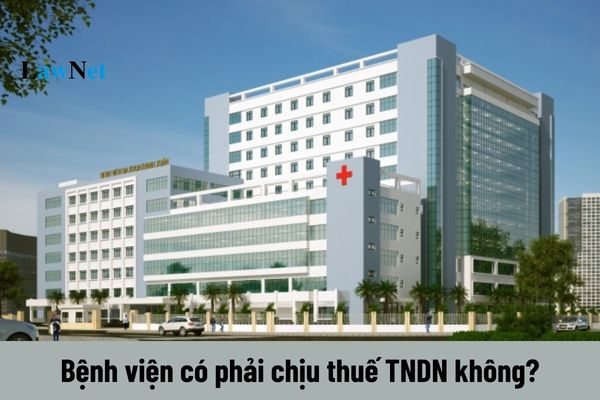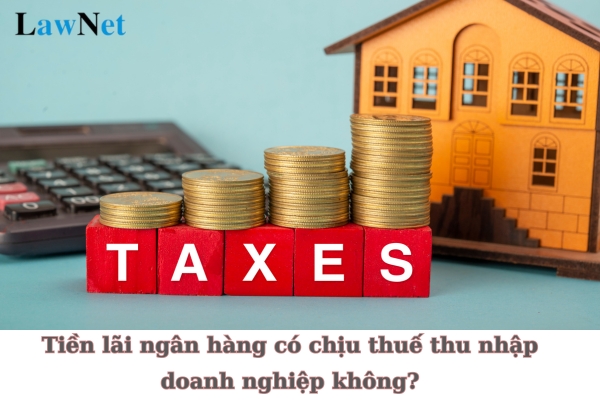Are public hospitals subject to corporate income tax in Vietnam?
Are public hospitals subject to corporate income tax in Vietnam?
Pursuant to Clause 1, Article 4 of Circular 128/2011/TT-BTC, provisions on tax-exempt income and taxable income are specified as follows:
Corporate Income Tax:
- Tax-exempt income and taxable income:
1.1. Tax-exempt income:
Income from medical examination and treatment services according to the fee schedule for medical services stipulated by the Minister of Health for public medical institutions under the Ministry of Health or by the Chairman of the Provincial People's Committee for public medical institutions under local management; Income from clinical nutrition services according to disease policies: via the digestive tube, via the intravenous route; Income from preventive medicine, testing, and fee-charging appraisal services as per the regulation on fees and charges; and other tax-exempt corporate income as prescribed in Section VI, Part C of Circular No. 130/2008/TT-BTC dated December 26, 2008, of the Ministry of Finance.
1.2. Taxable income:
Income from healthcare services (outside the income specified in clause 1.1 of this article) and other income as regulated.
...
Thus, public hospitals are subject to corporate income tax if they engage in healthcare services and other income-generating activities outside the specified exempted incomes.

Are public hospitals subject to corporate income tax in Vietnam? (Image from the Internet)
What are the corporate income tax Incentives for enterprises providing healthcare service in Vietnam?
Based on Clause 3, Article 19 of Circular 78/2014/TT-BTC (as amended by Clauses 3 and 4, Article 11 of Circular 96/2015/TT-BTC) stipulating preferential tax rates as follows:
Preferential Tax Rate
...
- A 10% preferential tax rate during the entire operation period applies to:
a) The income portion from enterprises from private investment in the fields of education and training, vocational training, healthcare, culture, sports, environment, and forensic appraisal (commonly referred to as socialization fields).
The list of types, scale criteria, and standards for enterprises implementing socialization is according to the list stipulated by the Prime Minister of the Government of Vietnam.
b) The income portion from publishing activities of the publisher according to the provisions of the Publishing Law.
Publishing activities include publishing, printing, and distributing publications according to regulations of the Publishing Law.
Publications are as specified in Article 4 of the Publishing Law and Article 2 of Decree No. 111/2005/ND-CP dated August 26, 2005, by the Government of Vietnam. If regulations of the Publishing Law, Decree No. 111/2005/ND-CP, and other legal normative documents relating to publishing change, the new regulations apply, in accordance with these documents.
c) The income portion from printed press (including advertising in printed press) of press agencies as stipulated in the Press Law.
d) The income portion of enterprises from implementing investment projects in social housing for sale, lease, or lease purchase to the subjects specified in Article 53 of the Housing Law.
Social housing as stipulated at this point is housing invested and built by the state or organizations, individuals from all economic sectors, meeting housing criteria, sale prices, rental prices, and lease purchase prices, for eligible subjects to buy, rent, or lease purchase social housing according to regulations of housing laws and applying a 10% tax rate does not depend on the timing of signing sales, lease, or lease purchase contracts for social housing.
If enterprises that invest in social housing sign transfer contracts with advance payment from customers before January 01, 2014, and continue to receive payments after January 01, 2014 (enterprises have declared temporary CIT payments on income or at the rate on revenue obtained) and have a house handover date on or after January 01, 2014, the income from these house transfer activities will apply a 10% tax rate.
Income from social housing investment and business applicable to a 10% tax rate is income from sale, lease, or lease purchase arising from January 01, 2014. If an enterprise cannot separately account for the income from sale, lease, or lease purchase of social housing arising from January 01, 2014, the income applicable to the 10% tax rate is determined in proportion to the revenue from activities of selling, leasing, or leasing purchase of social housing over the total revenue during the corresponding period of the enterprise.
e) The income of enterprises from: planting, tending, and protecting forests; income from planting, husbandry, aquaculture, processing agricultural and aquatic products in disadvantaged areas; aquafarming in disadvantaged areas; production, breeding, and generating varieties of plants and animals; production, extraction, and refining of salt, excluding salt production as stipulated in Clause 1, Article 4 of Decree No. 218/2013/ND-CP; Investment in post-harvest preservation of agricultural products, preservation of agricultural, aquatic products and food, including investments to directly preserve or to lease for preservation of agricultural, aquatic products and food.
f) The income portion of cooperatives engaged in agriculture, forestry, fishery, and salt production activities not located in disadvantaged areas or particularly difficult areas.
...
Thus, enterprises providing healthcare service will benefit from a 10% tax rate incentive on corporate income tax for the portion of the enterprise's income from healthcare activities throughout their operational period.
Are enterprises providing healthcare service in disadvantaged areas eligible for corporate income tax exemptions or reductions in Vietnam?
Pursuant to Article 20 of Circular 78/2014/TT-BTC (as amended, supplemented by Clause 1, Article 12 of Circular 96/2015/TT-BTC) regarding tax exemption and reduction incentives as follows:
- Four-year tax exemption, a 50% tax reduction for the next nine years for:
+ The income of enterprises from implementing investment projects specified in Clause 1, Article 19 of Circular No. 78/2014/TT-BTC (amended, supplemented at Clause 1, Article 11 of this Circular).
+ The income of enterprises from implementing new investment projects in private investment at areas with difficult or especially difficult economic and social conditions as stipulated in the Annex issued with Decree No. 218/2013/ND-CP.
- Four-year tax exemption, a 50% tax reduction for the next five years for the income of enterprises from implementing new investment projects in private investment at areas not listed as difficult or especially difficult in the Annex attached to Decree No. 218/2013/ND-CP of the Government of Vietnam.



- What is the currency unit used in tax accounting in Vietnam?
- Which enterprise groups will the General Department of Taxation of Vietnam focus on inspecting and auditing in 2025?
- What are guidelines on online submission of unemployment benefits application in Vietnam in 2025? Are unemployment benefits subject to personal income tax?
- How long can the tax audit period on taxpayers’ premises in Vietnam be extended for complex matters?
- From January 1, 2025, which entities are exempted from ferry service fees from the state budget in Vietnam?
- How to determine VAT applicable to ships sold to foreign organizations in Vietnam?
- What is the maximum penalty for late submission of tax declaration dossiers in Vietnam?
- What is the duty-free allowance on gifts given for humanitarian in Vietnam?
- Are votive papers subject to excise tax up to 70% in Vietnam?
- Shall enterprises use invoices during suspension of operations in Vietnam?

